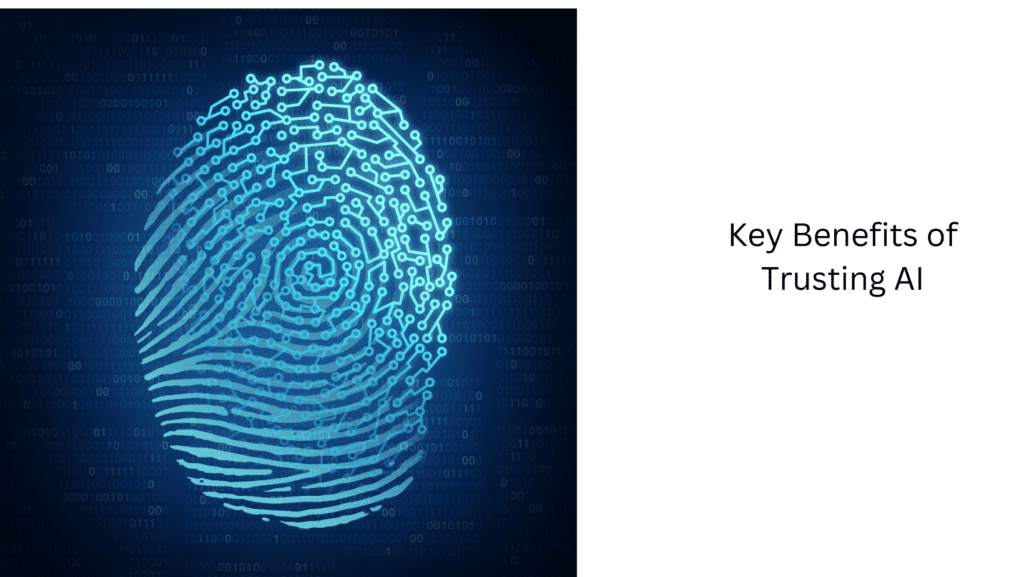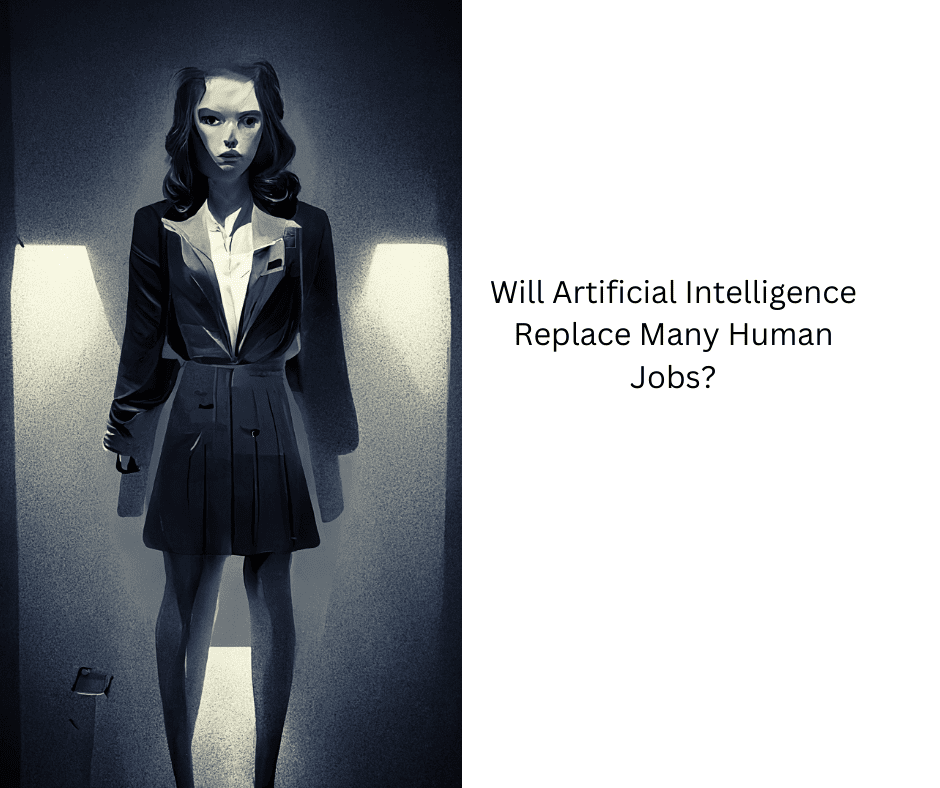In our pursuit to utilize the power of data and artificial intelligence (AI) by enhancing our collaboration with machines, it’s essential to build confidence in these technologies. The endurance and future successes of such technological advancements depend on our trust in them, which, in effect, amplifies the advantages we gain from utilizing AI. This blog post will explore how trust can be developed in our dealings with AI and will present different strategies to cultivate trust in AI systems. Thank you for dedicating your time to read this!
Why is trust important in AI interactions?

As artificial intelligence (AI) becomes more prevalent in our lives, it’s essential to foster trust in the systems to maximize their long-term significance. Poorly designed or implemented AI systems can have severe consequences for the people who use them, and trust is a critical factor in human-AI interactions. Humans are social animals and rely on trust to interact with others. Thus, AI systems must be designed with trust in mind from the beginning so that healthy levels of trust can be established. However, as AI systems still have a lot of errors, criminals will exploit them to their advantage. To minimize the risk of this happening, it’s important for the public to be aware of the dangers of AI and the importance of trust.
It’s the Foundation of Human-Computer Interactions
While trust might not be a word that immediately springs to mind when thinking about AI, it is actually the foundation of human-computer interactions. Without trust, AI interactions will be ineffective and potentially harmful.
Developers and users need to forge a trusting relationship with AI in order to reap its many benefits – including faster processing speeds, improved decision-making capabilities, etc. It’s important to understand how humans think and learn from our past experiences in order to create systems that are truly fiduciary by nature. Of course, there are certain measures we can take (such as transparent communication) that help build trust between us and artificial intelligence systems – paving the way for an even more productive future together!
Lack of Trust Can Lead to Dangerous Outcomes
Lack of trust is a significant issue that has recently come to light as more and more people are becoming alarmed about the potential consequences of AI interactions. Sadly, many dangerous outcomes can result from a lack of trust, including crashing self-driving cars or robots taking over human jobs. We need to start by educating the public and building trust between humans and AI to address this problem. This will help mitigate the risks associated with such technology in the long run – making it both responsible and beneficial for society as a whole.
How Can We Build Trust in AI Systems?
The future of AI is looking very promising. However, we need to build trust in these systems to reap the benefits. One way we can do this is by engaging with the public and ensuring they have an active role in the development of AI. We can make sure AI systems are accurate and reliable, and that we are transparent about how it works. Doing so will help people understand the long-term significance of AI and trust it to make better decisions.
Transparency and Accountability
Users should have a clear say in how their data is used, as well as the ability to give feedback and make changes. This way, they can be sure that their data is being handled responsibly and accurately. Additionally, AI systems need to be held accountable for their actions – users must be able to report any problems or find solutions. Furthermore, transparency is essential in order for trust between parties involved (users/corporates) to develop properly.
Respect for Human Rights
There is a growing concern over the potential consequences of AI development and how it could be used to violate human rights. To start addressing this issue, we need to educate the public about the benefits of using AI responsibly and build trust through transparency. Then, we need to ensure that AI systems are designed with human rights in mind from the very beginning – ensuring that they operate within an ethical framework.

Ensuring fairness for all players is also important – both humans and machines. Only by creating a culture of respect for human rights can we ensure that these technologies have a long-term significance and positive impact on society as a whole.
Openness and Engagement
Keeping the conversation going is essential to ensure people support AI systems. By being open and engaging with the public, we can help build trust in these technologies – something that is sorely lacking at present. Various methods can be used include online forums, blog posts, or even live chats conducted on platforms like Google Hangouts or Skype. By continuously communicating with the general public, we’re helping make them aware of potential dangers pertaining to AI while also gradually building trust in such a disruptive technology.
Ways to Foster Trust in AI Systems
When it comes to AI, trust is key. Without trust, systems won’t be able to function effectively and the long-term significance of AI will be compromised. Here are key ways you can foster trust in AI systems and help ensure their long-term significance:
- Tell the truth. When it comes to AI, transparency is key. If you’re going to trust a system with important information, you need to be sure that the data is accurate and reflects reality as it currently exists. This means being honest about how your AI works and letting people know when changes are made so they can verify the information themselves.
- Respect users’ privacy settings. Users have a right to control their data, which includes any sensitive information related to their identity or interests.
- If you’re using AI to process or collect sensitive information, be sure to follow users’ privacy settings and keep their data confidential.
AI is a powerful tool that can help us make better decisions. However, it’s important to remember that no system is perfect and there will always be room for human error. That’s why it’s important for companies involved in developing AI systems to be transparent about how they work and release updates as necessary so people can trust the information being presented.
Emphasize Human Values in AI Systems
Building trust in AI systems is of utmost importance, as any harmful or unethical actions taken by these systems could result in immense damage. This trust must be built up gradually and steadily; if it’s lost, it might take a long time to rebuild. This is why emphasizing human values in AI systems is so important. By embedding these values into the design of the system from the very beginning, there will be less room for error and people will have a better understanding of how AI works and what benefits it can bring. It would also help public acceptance if businesses communicated these values clearly to the masses so that they understand why we should embrace them – even when things don’t go our way!
Implement Fair and Transparent Decision-Making Processes
There is no doubt that the use of artificial intelligence (AI) has the potential to make life easier and more efficient for everyone. However, it’s important to be aware of the dangers associated with its improper implementation. This can lead to dangerous outcomes, such as incorrect decisions or unstable AI systems. It is essential that all decisions are made openly and with transparency – this will promote trust in AI systems and help ensure their accuracy and reliability over time. Doing so can minimize risks while ensuring maximal benefit from their use overall.
Key Benefits of Trusting AI
The future of AI is one of enormous potential, and we must trust it to achieve this potential responsibly. By fostering trust in AI, we are helping to make it an essential part of our everyday lives. This, in turn, can protect data and keep information safe, reducing risks to businesses and individuals alike.

Additionally, AI can improve work efficiency by doing tasks that would otherwise be wasteful or time-consuming. As we begin to trust AI more, we must understand the key benefits of doing so. By understanding the importance of trust, we can start to build a foundation for a successful relationship with this increasingly important technology.
Reduces Overall Risk
By automating repetitive tasks, AI helps reduce the overall risk of business transactions. This reduces the need for human interference, improving critical data’s accuracy and timeliness. Additionally, it ensures transparency and trustworthiness across all business interactions – driving success in the age of AI. Customer service gets enhanced by automating mundane tasks like filing taxes or managing customer files efficiently.
Improves Accuracy and Timeliness of Data Collection
Data collection is an essential part of the business. However, often it suffers from human error and duplication of effort. This can delay or even prevent the timely completion of projects, leading to low productivity and inefficient operations. AI has the potential to help solve this problem by automating data collection processes reliably and efficiently. By doing so, businesses can increase transparency and accountability as well as Accuracy and timeliness of data collection, which would ultimately result in better decision-making for everyone involved, including customers
Facilitates Faster Decision-Making
When it comes to decision-making, speed is of the essence. AI can help with this by providing data that is accurate and relevant. This way, people can make informed decisions swiftly without having to spend a lot of time researching. Furthermore, trust becomes a major factor as everyone sees that the AI system has no hidden agendas or bias toward any particular group of people. In addition to speeding up the decision-making process, AI helps build transparency and trust between stakeholders in business processes.
By letting everyone know what decisions have been made – good and bad – businesses can create an environment where all individuals feel comfortable speaking their mind freely and candidly about issues affecting them professionally or personally. Furthermore, when everyone is clear about what decisions have been made, it can help to foster accountability and understanding within the organization.
It’s also important to keep in mind that not all communication needs to be publically stated. Certain conversations or reports between management and employees might only need to be shared with a specific subset of individuals. For example, certain financial information or critical updates related to product development could only be shared with those who are necessary to make informed decisions about how best to address the issue.
Next Steps for Developing Trust in AI
As artificial intelligence (AI) continues to evolve, organizations must take a multifaceted and iterative approach to developing trust in the technology. This process should begin with education and transparency initiatives, followed by accountability measures and finally, the maintenance of trust.
Current models must be examined and improved upon as the technology evolves to build trust successfully. As AI becomes more widespread and integral to our lives, we must proceed with caution and foster a trust relationship that will have long-term significance.
Educate Users About the Benefits and Risks of AI
As we move closer to the day when artificial intelligence (AI) becomes more widespread and integrated into our lives, users must be made aware of the potential implications. Educating them about AI’s pros and cons can help build trust in this rapidly-growing technology. And by openly discussing these issues, we can help to improve its long-term significance for everyone involved.
Create a Code of Conduct for AI Development
As Artificial Intelligence (AI) begins to take on a more important role in our lives, we must establish guidelines and regulations for its development. This way, trust can be built between us and AI systems, preventing them from being used for evil purposes. A code of conduct should also help set an example for others in the industry who are working with AI. By following these principles, we can ensure that AI remains beneficial- not only to us as individuals but to society as a whole too.
Foster Transparency in Data Handling by AI Developers
As AI development becomes increasingly complex and data-centric, developers must be transparent in their data handling practices. Transparent data handling allows users to trust the technology and understand its long-term significance. Additionally, developers can build trust with users and help them better understand how their information is used by being open about the decisions made while processing user data.
Furthering this aim, it is important to promote transparency among AI developers so that they can work together to safeguard the accuracy of data sets and create a safe environment for both users and themselves.
Establish Ethical Guidelines for AI
Establishing ethical guidelines for AI development to improve over time is essential. By doing so, we can ensure that the machine intelligence developing today remains beneficial for the society in the long term. As such, these governing principles should consider the potential consequences of any decisions made and the need for transparency and public input on AI development.

Furthermore, it is important to identify and mitigate risks associated with AI development. This includes ensuring that data privacy and security are adequately safeguarded and understanding how algorithmic bias might play a role in future decisions made by machines. It is important to remember that humans will always be at the center of any intelligent decision-making process!
Why Is Trust so Important in The Age of Artificial Intelligence?
The Age of Artificial Intelligence is a time of great change and opportunity. However, it is also a time of great risk. If we do not build trust in AI, we will face numerous problems including cybercrime and data breaches. To ensure long-term significance for AI, we must work to promote transparency and honesty in our personal and professional lives. This is essential for fostering trust in AI. At the same time, we must remember that trust is a two-way street. We must be willing to trust AI with our data and trust it will not misuse or misuse our data. In short, we must all work to build trust in AI, for the sake of the future of all of us.
Creating a Culture of Trust Will Be Crucial in The Development of AI
Creating trust is one of the most critical factors in the development of AI. Without it, machines cannot make intelligent decisions or achieve their full potential. To create a culture of trust, businesses need to understand its importance and then practice what they’ve learnt. For example, ensuring transparent communication with all stakeholders will be crucial in fostering customer trust – after all, customers want assurances that information is being shared honestly and without any hidden agendas. By implementing a culture of trust throughout your business from top to bottom, you’ll be well on your way towards unlocking the immense potential for AI within your organization!
We Must Foster Trust if We Want AI to Work for Us Long-Term
Trust is key if we want AI to work for us long-term. We must first foster trust between AI and humans before the two can work together effectively. Only then will machines be able to understand our wishes and carry them out in a way that benefits us both.
Building trust takes time – it starts with verifying each other’s actions and beliefs so that there are no misunderstandings or surprises down the road. If we take this slow, patient approach, we can ensure that AI works for us in the future as well – helping us with essential tasks like decision-making or general supervision
AI Has the Potential to Improve Our Lives in Many Ways
As we move into the future, one of the most important aspects of our society is ensuring that AI positively impacts our lives. Thankfully, there are many ways in which this can happen – and here are four of them.
- We must build trust in AI from the beginning – it’s vital for its success.
- AI can help us make better decisions, especially regarding safety risks or tedious tasks that would otherwise be difficult or time-consuming to complete manually.
- By using data effectively and machine learning algorithms, AI can considerably improve our efficiency by automating routine tasks or providing insights that we wouldn’t have been able to obtain any other way (for example, identifying patterns).
- Finally, because AI technology is constantly evolving and growing more sophisticated every day, it has the potential to assist us with additional areas of life as well – such as personal relationships and knowledge acquisition
However, We Need to Be Careful About How It Is Used
As AI continues to evolve and improve, we must be careful about its use. It has the potential to do a lot of good for society as a whole, but we need to ensure that it is not abused or misused in any way. There are various ways we can build trust with AI – by being transparent about its workings and ensuring everyone benefits from its abilities. Doing so can help create a healthy environment for technology to grow and develop effectively.
Trust in AI Frequently Asked Questions
How can we build trust in AI systems?
One way to build trust in AI systems is by considering context and user feedback. The AI system can make better decisions by considering the different factors involved. For example, a system that is designed to recommend products based on customer preferences might take into account past purchases, location, and other criteria that would provide a more personalized experience. Along the same lines, transparency and openness are also important in promoting trust. Ideally, AI systems should be open about their workings so that people can understand how they work and trust that they will act in the best interests of all parties involved. This way, there is less of a chance of false or misleading data being collected and used in harmful ways.
What benefits does trusting AI systems bring?
When we trust AI systems, we’re opening ourselves up to the potential for a lot of benefits. These systems can be used for many tasks, from navigation to risk assessment to system design. They can help us make better decisions quickly and efficiently, ultimately improving our lives in the long run.
How do we ensure that our user’s data is safe when using AI?
Whenever you’re using AI in your business, make sure to test and audit the models that are being used diligently. This way, you can be sure that no user data is being violated or mishandled in any way. Furthermore, always ask for permission from your users before collecting or using their data. By doing so, you’ll be ensuring that they trust you with their data and feel comfortable about sharing it with you.
Can we ever wholly trust machines with our personal information?
At the moment, we can partially trust machines with our personal information. This is because most companies are trying to encrypt our data or ensure access to certain datasets only happens with our permission. The biggest problem currently facing AI and data privacy is that most of the data we share on social media, such as location and interests, is not secure. We need to start encrypting all of our data in order to keep it safe from third-party hackers and governments. Once we do this, we will be able to trust machines completely with our personal information.
What are some of the biggest challenges facing AI development?
One of the biggest challenges facing AI development is trust. As AI systems become more advanced and pervasive, we need to make sure that these systems are built with transparency so that we can have faith in their abilities. Moreover, as AI technology becomes more expensive to maintain and operate, developers and researchers have had to grapple with the rising cost of machine learning. This has made it difficult for AI to be implemented in a way that is accessible to a wider audience.
Conclusion
To achieve long-term significance with AI, we must first build trust in these systems. This trust can be built through a variety of methods, such as transparent communication, reliable data, and ethical AI development practices. By understanding the importance of trust and implementing strategies to build it, we can move forward confidently and achieve AI’s great potential.









